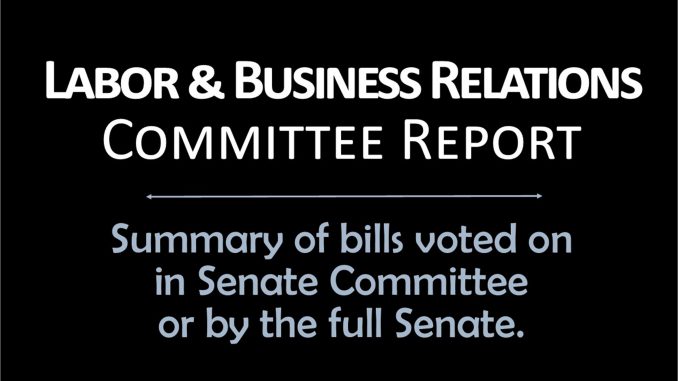
On this page
COMMITTEE ACTION:
SF 2366/SSB 3158—Medicaid Work Reporting Requirements and Food Assistance Changes
SSB 3158, as introduced, prohibits the Department of Human Services (DHS) from allowing categorical eligibility for Supplemental Nutrition Assistance Program (SNAP) unless forced to do so by federal regulations. Trump Administration rules have already been changed to do this. An amendment adopted in committee strikes this section of the bill.
The bill prohibits DHS from seeking, applying for, accepting or renewing any waiver of work requirements for the SNAP program. The Trump Administration already is taking this option away from states. The final rule is set to take effect on April 1, 2020, though any legal challenges could cause delays in the implementation date of the rule.
SNAP recipients are to be assigned to an employment and training program.
The bill requires the DHS to submit any state plan amendment or waiver necessary, and adopt rules as necessary to administer this bill. The bill requires all Medicaid recipients (not just Health and Wellness Plan, like last year) to be working 20 hours per week; complying with a work program for 20 hours per week; volunteering 20 hours per week; meeting a combination of work and work program participation requirements; or participating and complying with the requirements of a workfare program.
Some Medicaid members are exempt, including those under 18; over 64; medically certified as physically or mentally unfit for employment (an amendment added to this definition, but the language adopted was still problematic); pregnant; parent or caretaker responsible for the care of a dependent child under one year or age; parent or caretaker personally providing the care for a dependent child with a serious medical condition or with a disability, as determined by DHS; is receiving unemployment compensation and complying with work requirements that are part of the federal-state unemployment compensation system; or is participating in a drug rehabilitation program.
The other amendment adopted in committee added changes to
the Child Care Assistance Plus program, allowing families at higher incomes to
remain eligible for benefits after they go over the entrance eligibility
threshold.
[2/20: 6-5 (No: Democrats, Nunn]
FLOOR ACTION:
SF 2272 – Public Assistance Restrictions
SF 2272, as amended on the floor, directs the Department of Human
Services to comply with federal regulations that require data matching with a
national clearinghouse to provide real-time prevention of duplicate
participation in the Supplemental Nutrition Assistance Program (SNAP)
program. The bill also creates additional oversight and restrictions,
including eligibility determination and redeterminations, identity
authentication and asset identification for all public assistance programs. The
definition of public assistance includes children’s health insurance programs,
Medicaid, SNAP and the Family Investment Program (FIP). DHS must contract
with third-party vendors as defined by the federal Fair Credit Reporting Act to
do multiple data matches on all applicants. The bill lists many sources of
possible data matches and databases that must be checked from federal, state
and other public sources. A contract for the services must save more money than
the contract costs. The bill requires real-time verification. The
bill sets up a process for recipients to dispute a discrepancy or change in
circumstances.
[2/26: 32-17 (Yes: Republicans; No: Democrats, Excused: R. Taylor)]
